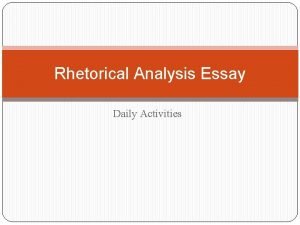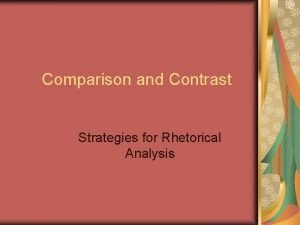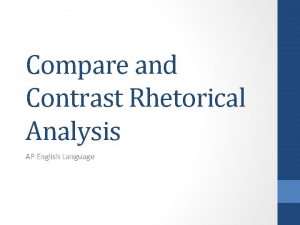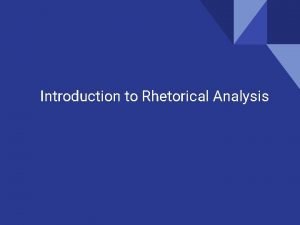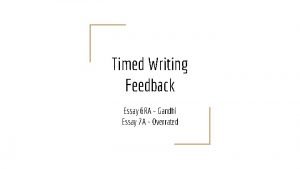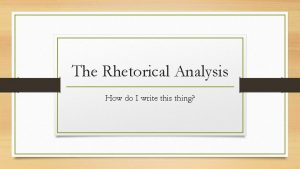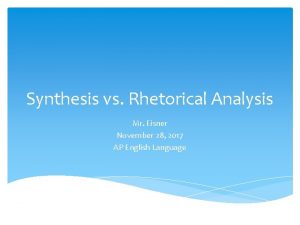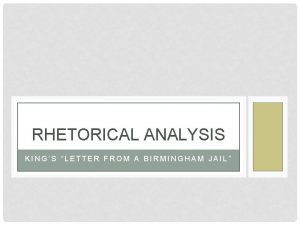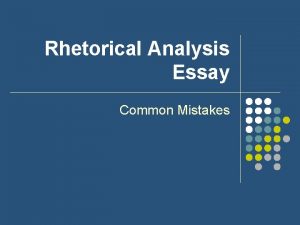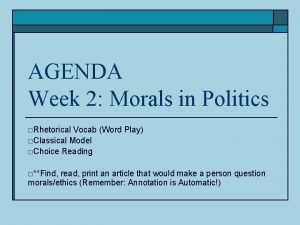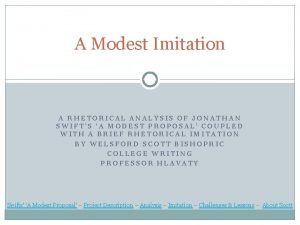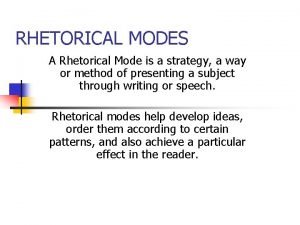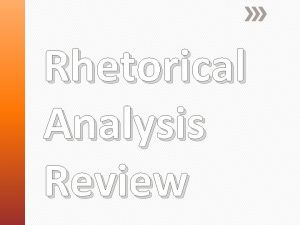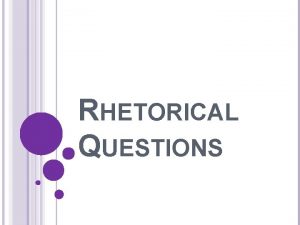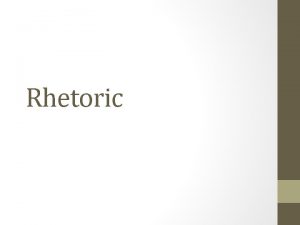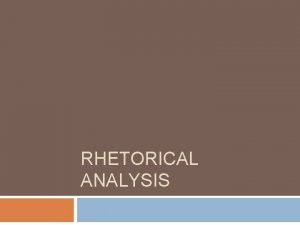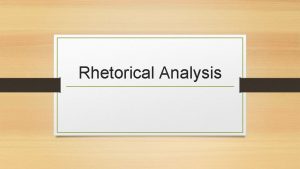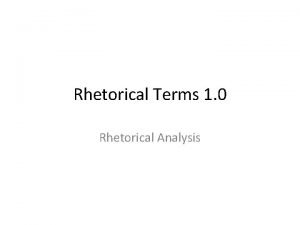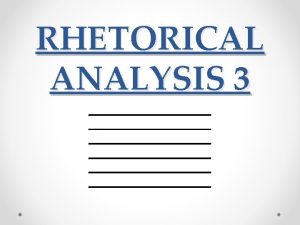Introduction to Rhetorical Analysis AP English Language and























- Slides: 23

Introduction to Rhetorical Analysis

AP English Language and Composition “An invitation to the conversation among educated adults. ”

Overview of the APELC Test SECTION ONE � Multiple Choice � 60 Minutes � 50 -60 Questions � 45% of your total score SECTION TWO � THREE Essay Responses � 120 minutes (40 min/each) � Q 1 - Synthesis � Q 2 - Rhetorical Analysis � Q 3 - Argument � 55 % of your total score

To paraphrase Aristotle. . . Everyone uses rhetoric but those who understand it can control those who do not.

Definitions ● Rhetoric: the art of effective or persuasive speaking or writing ● Rhetorical Analysis: analysis of what the author is saying and the techniques she is using to advance her ideas and affect his audience in order to achieve her purpose

Reading Rhetorically • All authors have a purpose for writing. To make the audience… ○ Think their way ○ Adopt their point of view ○ DO something • It’s not always about you. Your feelings don’t matter. • WHAT author says + HOW she says it = achieve purpose ○ HOW: rhetorical strategies ■ Use your packet! Know it! Learn it! Love it!

Rhetorical Triangle

SOAPSTone ● Starting point for how to analyze a text ● Get good at this! ○ Will do for all texts we read ○ Make it a habit ● Speaker ● Occasion ● Audience ● Purpose ● Subject ● Tone

Speaker ● The communicator who produced the work. Consider: ○ Who are they? ○ What is their background? ○ What is their expertise? ○ What are their biases? ● Be specific. Not just their name. ● John Mc. Cain, Republican Senator from Arizona. Vietnam veteran. Ran against Obama for President (lost). Known for being conservative but also a “maverick” who would work with democrats.

Occasion ● Context!! ● What’s happening in the world that’s causing the author to write this text? ● Not just the date. ● After a lifetime of public service, Mc. Cain is on his deathbed. This is his final public statement. Trump has recently been elected president and both congress and the country are extremely divided along partisan lines.

Audience ● Who’s reading/watching it? ● Be specific. Not “everybody” or “people. ” ● What can you infer about their: ○ Education level? ○ Socio-economic status? ○ Beliefs? ○ Interests? ● The informed adult public in the United States who follow politics, both actively and passively. Those who are extreme partisans, including politicians.

Purpose ● ● What does the speaker hope to accomplish? What will the audience do if he is successful? Use a rhetorically active verb. Not “inform. ” Discuss with the people at your table: what is Mc. Cain’s purpose in writing this letter? What’s his message? What does he want his audience to do?

Subject ● ● ● The general topic and content of the text. Can be explicitly stated or implied. Don’t overthink it. Use a noun. Discuss with the people at your table: what is this letter about?

Tone ● The speaker’s attitude towards the subject. Consider: ○ What striking uses of diction (word choice), syntax (sentence structure), details, and imagery help to convey the speaker’s attitude? ○ What mood does the speaker create? ● Discuss with the people at your table: Find the “Tone” page of your handbook (p. ___). Identify the tone. Be prepared to justify your response.

SOAPSTone Video

Ticket out the door Do a SOAPSTone analysis of today’s lecture. Speaker: Occasion: Audience: Purpose: Subject: Tone:

Rhetorical Appeals: Ethos ● Appeals to the reader’s sense that the author is credible ○ For example, the author is an expert in his or her field or is highly knowledgeable about the subject matter. Or, the author refers to/cites an expert. ○ Example: As a vet with twenty years of experience, I can tell you that Taquito is a very bad dog.

Analysis Work with the people at your table to explain how John Mc. Cain appeals to ethos in his letter.

Rhetorical Appeals: Pathos ● Appeals to the reader’s emotions. ○ The author uses examples or language designed to stir up feelings of anger, compassion, happiness, fear, etc. Always specify which emotion. ○ Example: You can’t blame Taquito for stealing the entire pizza--the poor thing was starved as a puppy on the mean streets of TJ.

Bush Speech Analysis Use your interview and the work we did in class today to analyze how Bush appeals to pathos in his speech. Reminders: ● Specify which emotions ● Give examples/specific quotes from the text ● Connect to the rhetorical triangle: Who is his audience? How does appealing to these emotions help him to achieve his purpose?

Rhetorical Appeals: Logos ● Appeals to logical ideas and develops the ideas with appropriate reasoning, examples and/or details ○ Uses facts, figures, statistics, logic, etc. ○ Example: According to a recent survey, 100% of people agree that Taquito is adorable.

Obama Letter Analysis Work with a partner to answer these questions: 1) How does Obama characterize the debate about his birth certificate? 2) With what does he juxtapose that debate? 3) What is his purpose in doing so?

Overview ● Rhetorical analysis: what strategies does the author use to achieve her purpose? ○ HOW do they get their audience to do/think something? ○ Strategies: ■ Rhetorical devices ● Metaphor, hyperbole, diction, etc. ● Rhetorical appeals (ethos, pathos, logos) ■ Your own observations
 Rhetorical thesis
Rhetorical thesis Compare and contrast rhetorical analysis
Compare and contrast rhetorical analysis Ap lang compare and contrast essay
Ap lang compare and contrast essay Persona ap lang
Persona ap lang A level english language language change
A level english language language change Is repetition ethos pathos or logos
Is repetition ethos pathos or logos Rhetorical analysis thesis example
Rhetorical analysis thesis example Purdue owl rhetorical situation
Purdue owl rhetorical situation Gandhi letter to lord irwin rhetorical analysis
Gandhi letter to lord irwin rhetorical analysis Rhetorical analyses
Rhetorical analyses Synthesis vs rhetorical analysis
Synthesis vs rhetorical analysis Soapstone notes
Soapstone notes Rhetorical analysis of letter from birmingham jail
Rhetorical analysis of letter from birmingham jail Transitions for rhetorical analysis
Transitions for rhetorical analysis Rhetorical analysis hook example
Rhetorical analysis hook example Mary oliver owls
Mary oliver owls Letters from birmingham jail rhetorical analysis
Letters from birmingham jail rhetorical analysis Examples of choices in spacecat
Examples of choices in spacecat How to write a rhetorical analysis essay ap lang
How to write a rhetorical analysis essay ap lang Not by math alone rhetorical analysis
Not by math alone rhetorical analysis Jonathan swift a modest proposal rhetorical analysis
Jonathan swift a modest proposal rhetorical analysis Example of rhetorical modes
Example of rhetorical modes The great influenza rhetorical analysis essay
The great influenza rhetorical analysis essay Rhetorical situation analysis
Rhetorical situation analysis
